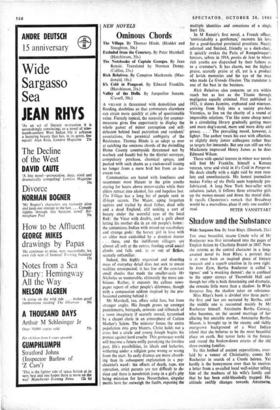NEW NOVELS
Ominous Chords
Excluded from the Cemetery. By Peter Marshall. (Hutchinson, 35s.) The Notebooks of Captain Georges. By Jean Renoir. Translated by Norman Denny. (Collins, 25s.) Rich Relatives. By Compton Mackenzie. (Mac- donald, 18s.) It's Cold in Pongo-ni. By Edward Franklin. (Hutchinson, 21s.)
Valley of the Dolls. By Jacqueline Susann. (Cassell, 30s.)
A VILLAGE is threatened with demolition and flooding, doubtless so that commuters elsewhere can strain more quickly at jobs of questionable value. Fiercely topical, the necessity for counter- measures gives fine opportunity to display the whole gamut of minor corruption and self- delusion behind local patriotism and residents' associations, the perennial ambiguity of the Resistance. Thomas Hinde is as adept as ever at catching the ominous chords of the dwindling Home County countryside threatened not by warlock and bandit but by the district surveyor, compulsory purchase, chemical sprays, and packed with such shams as a cuckoo-call issuing no longer from a mere bird but from an ice- cream van.
Communities are hazed with loneliness and resentment most blatant in the grim youths staring for hours above motor-cycles while their elders retreat into alcohol, lies and hopeless lust. The Village has a long list of people sunk in ill-kept secrets. The Major, aping forgotten squires and trailed by dead father, dead wife and a dead England, still seeking a sort of beauty under the scornful eyes of the local Red: the Vicar with doubts, and a guilt about letting his mother die in an old people's home: the sententious Indian with mixed-up vocabulary and strange gods : the horsey girl in love with an older man cuckolded by a drunken doctor . . . these, and the indifferent villagers are almost all soft at the centre, feuding amid social climbs and falls and, in or out of fiction, scarcely unfamiliar.
Indeed, this highly organised and diverting mass of everyday detail does not seek to create realities unsuspected; it has few of the constant small shocks that made the smaller-scale Mr Nicholas so memorable, ultimately the more am- bitious. Rather, it expands the callous news- paper report of other people's dilemmas, though with a compassion seldom inspired by the pro- fessional cunning behind it.
Mr Marshall, too, offers solid fare, but from stranger angles. His Joseph grows up amongst punishments, betrayals, sermons and tribunals of a town imaginary if scarcely unreal, tyrannised by a chapel cleric in an atmosphere of Cotton Mather's Salem. The minister forces the entire population into grey blazers, Christ holds not a cross but a circle and young Joseph begins his protest against herd cruelty. This grotesque world will become a future evilly parodying the loveless past, life's possibilities, its ideals and lecheries, withering under a religion gone wrong or wrong from the start. Its early dramas are more absorb- ing than its subsequent explanation in a psy- chiatrist's ward: the effects of death, rape, eye operation, strict parents are not difficult to de- duce and there is novelettish irony in a girl's pity being mistaken for love. Nevertheless, singular merits here far outweigh the faults, exposing the multiple identities and sensations of a single hurt life.
In M Renoir's first novel, a French officer, 'unmistakably a gentleman,' recounts his love for a good-hearted provincial prostitute. Neatly adorned and finished, friendly as a deck-chair, it quickly evokes the Paris of Rumpelmayer's hussars, sabres in 1914, poules de luxe to whom rich youths are dispatched by their fathers as to a crammer's. It has charm, not the highest praise, scarcely praise at all, yet is a product of lavish memories and the eye of the man who made La Grande Illusion. The translator is one of the best in the business.
Rich Relatives also concerns an era within reach but as lost as the Titanic through negligence equally criminal. First published in 1921, it shows Jasmine, orphaned and nineteen, arriving from Italy into a society pre-Ann Veronica, to live on the charity of a round of impossible relations. 'I'm like some cheap novel in a circulating library gradually getting more and more dog's-eared, more and more dirty and greasy. . . .' The prevailing mood, however, is
lighter. The author treats his cast with affection, as slightly dotty junior colleagues rather than as targets for innuendo. But one can still see why Mackenzie impressed Henry James as he does Edmund Wilson.
Those with special interest in minor war novels will find Mr Franklin, himself a Korean
veteran, terse and vivid in It's Cold in Pongo-ni.
He deals chiefly with a night raid by men reso- lute and unenthusiastic. His honest journalism makes Valley of the Dolls seem hopelessly pre-
fabricated. A long New York best-seller with salacious jacket, it follows three attractive girls up the money-mount and down the moral slide. It recalls Chesterton's remark that Broadway would be a marvellous place if only one couldn't read. PETER VANSITTART






































 Previous page
Previous page